In our collective quest for wellness and vitality, quality sleep remains elusive for many. The fast pace of modern life, filled with endless stimuli, often acts as a barrier to the peace and tranquility we seek at night. The importance of nurturing good sleep habits cannot be overstated; they directly influence our energy, productivity, and overall health, forming the foundation of our daily lives.
Yet, the path to better sleep is often littered with obstacles—whether it’s stress, the pervasive glow of technology, or lifestyle choices—each playing a disruptive role in our natural sleep rhythms. The epidemic of sleep deprivation extends into our daytime, leaving us weary when we need to be alert and paradoxically, wide awake when we crave rest. This cycle of struggling to fall asleep and stay asleep turns into a nightly battle, a tug-of-war with our own physiology.
Whether you’re dealing with occasional sleeplessness or grappling with more persistent sleep issues, the key lies in perseverance, patience, and a willingness to adapt. After becoming a mom, I faced sleep challenges myself and discovered that it took not just lifestyle changes but also a few clever hacks to get my sleep back on track. This article is all about hacks for better sleep. Let’s find our way to those perfect Z’s, to nights filled with peace, and to days brimming with vitality.

Understand Your Sleep Needs
First things first: understanding your unique sleep needs is like holding the map to Treasure Island. We often hear about the magic “8 hours of sleep,” but it’s not a one-size-fits-all deal. For me, diving into the world of sleep tracking with gadgets like the Oura Ring was a game-changer. It showed me not just how much sleep I was getting, but the quality of that sleep — deep, REM, you name it.
The Oura Ring, became my personal sleep coach, nudging me towards understanding my sleep patterns and how different factors, from stress to diet, influenced my nights. It was fascinating to see the data laid out, showing me the direct impact of a late-night snack versus a serene evening of relaxation.
But it’s not just about technology. It’s about listening to your body’s rhythm. Are you a night owl who thrives in the late hours, or are you an early bird, ready to conquer the world at dawn? Recognizing this can transform your sleep habits. For me, setting a consistent bedtime was very important. It didn’t happen overnight, but with patience and persistence, my body clock adjusted, and I found my sleep sweet spot.
Incorporating sleep-friendly practices into my routine also made a huge difference. From dimming the lights an hour before bed to magnesium and melatonin supplementation (on on these later!), these rituals helped signal to my body that it was time to wind down.
Of course, no discussion on sleep would be complete without addressing potential hurdles. Conditions like sleep apnea and insomnia are real challenges that many face, affecting sleep quality and overall health. If you suspect you’re dealing with a sleep disorder, consulting with a sleep medicine specialist can open the door to solutions tailored to your needs, ensuring that your journey to dreamland is as smooth as possible.
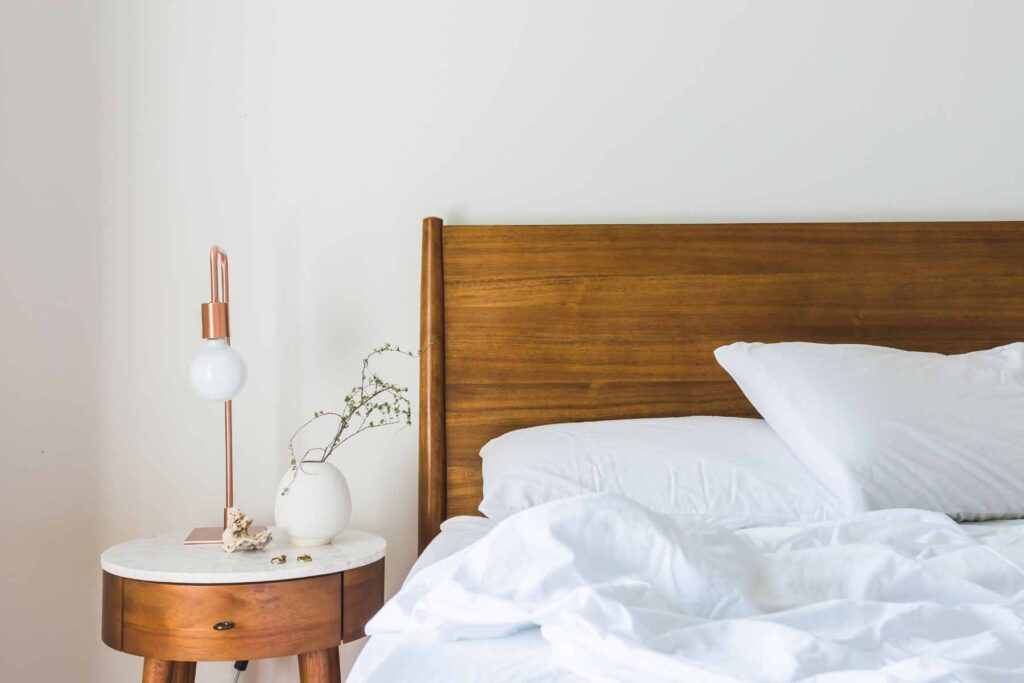
Create a Restful Environment: Your Sanctuary of Sleep
The bedroom is our personal haven, a sanctuary where the day’s stresses melt away, so let’s talk about light and noise, the notorious disruptors of sleep. Here’s where the magic of blackout blinds comes into play. Inspired by a dear friend’s suggestion, I decided to give them a try, and what a difference they made! These marvelous inventions block out that early morning sun and also add a cozy, cocoon-like feel to the bedroom. It’s like telling the world, “Hold on, sleep in progress.”
But what about if you have noise — the rumble of traffic, the neighbor’s late-night TV marathons? Get a white noise machine! This gadget can become as essential to your bedtime routine as your favorite pair of pajamas. It creates a soothing, consistent sound backdrop that drowns out the random noises of the night.
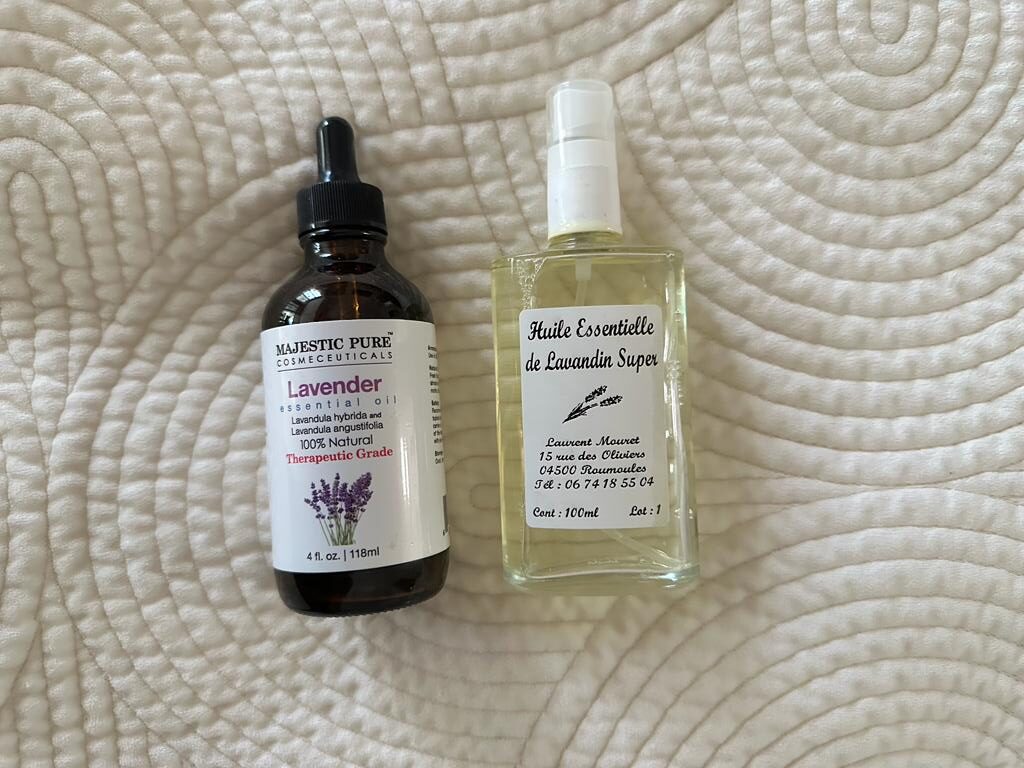
Temperature plays a crucial role in our sleep environment, too. Ever tried sleeping in a room that’s too hot or too cold? It’s about as restful as trying to snooze on a roller coaster. The ideal bedroom temperature is a cool, comfortable 60-67 degrees Fahrenheit (about 15-19 degrees Celsius). This range helps promote deep, uninterrupted sleep. My journey to finding this sweet spot involved a bit of trial and error, but once I did, it was like unlocking a secret level in the game of sleep — one where the prize is waking up feeling refreshed and rejuvenated.
And let’s not forget about scent. A diffuser with lavender or chamomile essential oils can work wonders in preparing your mind and body for sleep. These scents are like a gentle nudge towards relaxation, helping to clear your mind of the day’s clutter and easing you into a restful state.

Transforming your bedroom into a sleep-friendly sanctuary is an act of self-care, one that honors the importance of rest in our lives. It’s about creating a space that not only helps you sleep at night but also reflects your personal comfort and style. So, take a moment to look around your bedroom and ask yourself, “Is this space inviting me to sleep?” If not, consider it an opportunity to make some changes, however small they may seem. And let’s not forget about scent. A diffuser with lavender or chamomile essential oils can work wonders in preparing your mind and body for sleep. These scents are like a gentle nudge towards relaxation, helping to clear your mind of the day’s clutter and easing you into a restful state.
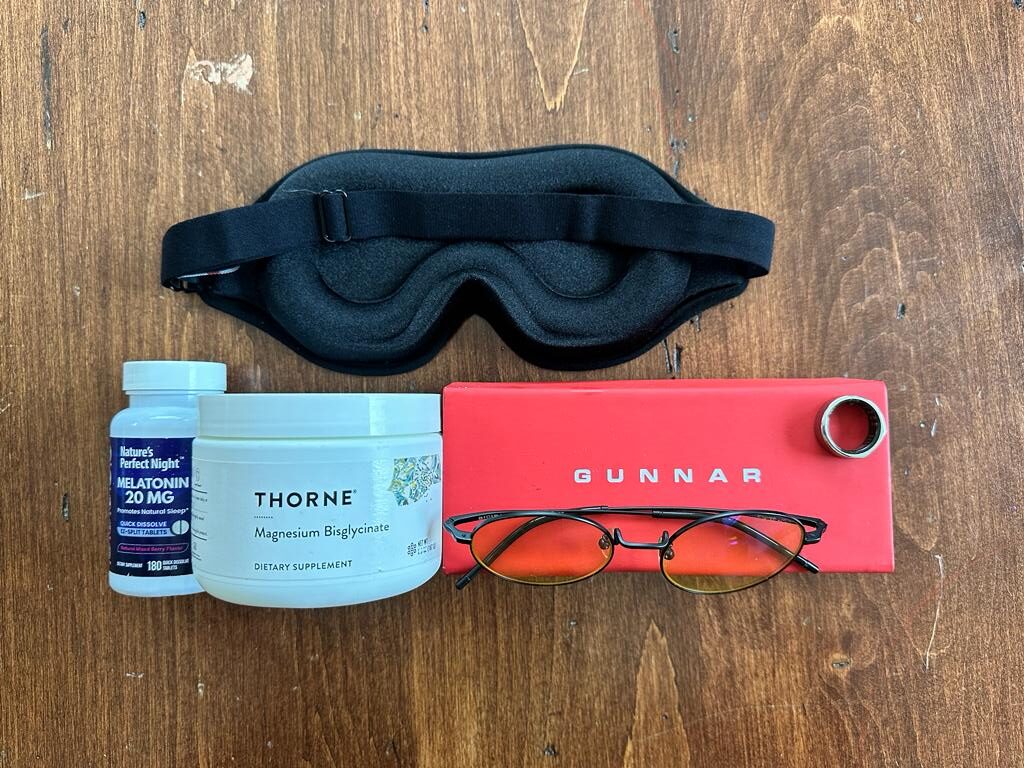
Establish a Pre-Sleep Routine
Establishing a pre-sleep routine is all about creating a series of calming activities that signal to your body and mind that it’s time to wind down. Let me share the rituals that work for me.
First, I address my body’s needs with supplements, specifically melatonin and magnesium. Melatonin, often dubbed the sleep hormone, is a cornerstone of my routine. It signals to your brain when it’s time to sleep and wake up. However, for many of us, this natural cycle gets out of sync. Introducing melatonin supplements into my evening has gently nudged my internal clock back to its natural rhythm, making it easier for me to fall asleep. Finding the right dosage was key, and for me, that’s 15-20mg a night. For a deeper dive into the benefits of melatonin, some of which may surprise you, see my full guide here.
Magnesium, a mighty mineral, plays a crucial role in relaxing muscles and calming the nervous system, creating the perfect internal conditions for sleep. Taking magnesium supplements has not only helped me fall asleep faster but has also improved the quality of my sleep. You can read my full article on magnesium here.
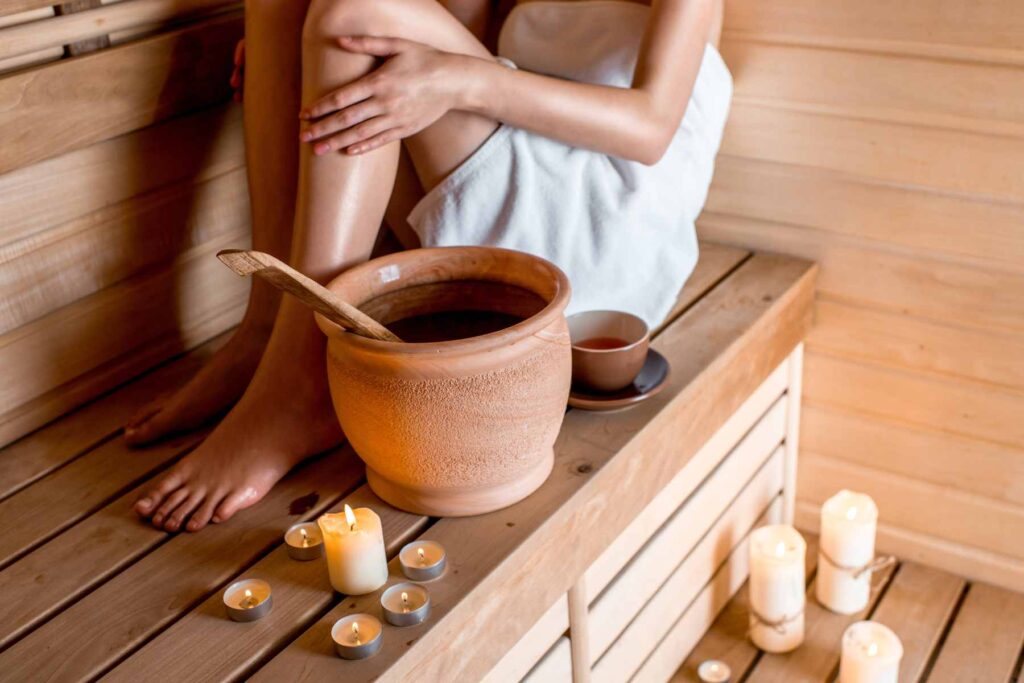
But supplements are just part of the equation. The activities leading up to bedtime are equally important. Borrowing practices from centuries-old traditions, I’ve incorporated a bit of modern-day spa into my nightly routine. A good sweat in a steamy shower can work wonders for relaxing muscles and clearing the mind, mirroring the effects of a sauna session. Following this with a quick cold plunge or a cool shower, you’ll feel your body instantly refreshed and more relaxed. This contrast bathing technique has been a game-changer for me, making me feel like I’m melting into the bed when it’s time to sleep.
The crown jewel of my pre-sleep ritual, however, is a warm, comforting drink. Imagine this: the house is quiet, you’re in your comfiest pajamas, and in your hands is a mug of something warm and soothing. For me, it’s often a cup of herbal tea or a magnesium-infused beverage. This quiet moment is when I reflect on the day, letting go of any stresses and preparing my mind for rest.

Creating a consistent bedtime routine is all about listening to your body and giving it what it needs to transition smoothly into sleep. It’s taken some trial and error to find what works best for me, but the impact on my sleep quality has been profound. I encourage you to explore and experiment with your pre-sleep routine. Whether it’s reading a book, practicing gentle yoga, or jotting down a few thoughts in a journal, find what soothes your soul and eases you into a restful night.

Opt for Sleep-Supportive Nutrition
Yes, what we eat and drink plays a starring role in the quality of our sleep! Think of each meal and snack as a building block, contributing to either a sturdy foundation for a restful night or a shaky structure that leads to restless tossing and turning.
I have found that eating early dinners has become a cornerstone of my sleep-supportive nutrition. Finishing my last meal of the day at least three hours before bedtime gives my body ample time to digest and signals that it’s time to shift from digestion to rest mode.

Caffeine and alcohol are also big no-nos in the quest for better sleep. As much as I love a good cup of coffee or the occasional glass of wine, I’ve learned to respect their impact on my sleep. Caffeine, a stimulant found in coffee, tea, and many soft drinks, can keep your mind racing long into the night if consumed too late in the day. To prevent this, I’ve set a personal cutoff time for caffeine at 2 PM to ensure it doesn’t interfere with my bedtime.
Alcohol, meanwhile, might seem like a shortcut to drowsiness, but it’s a bit of a trickster. While it may help you fall asleep faster, it profoundly impacts the quality of that sleep, often leading to interruptions and a reduction in REM sleep—the phase of sleep where the body repairs and rejuvenates itself. Thus, moderation and timing have become my guiding principles when it comes to enjoying a drink.
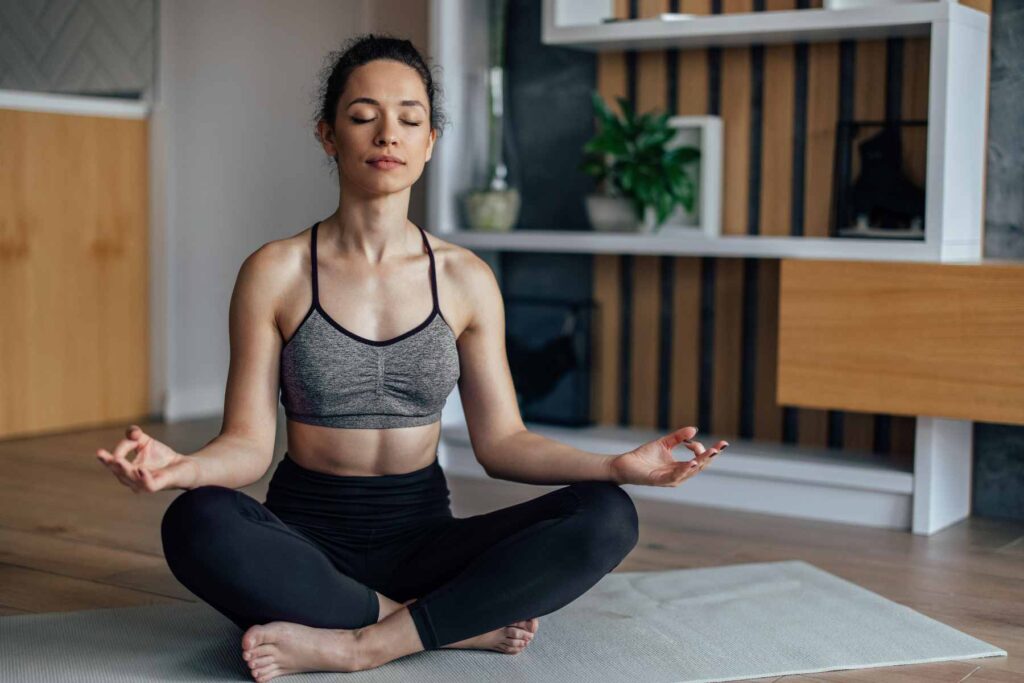
Incorporate Relaxation Techniques
Once your nutrition is aligned with your sleep goals, integrating relaxation techniques into your evening routine can further prepare your mind and body for a restful night. Techniques such as meditation, deep breathing, and reading serve as gateways to tranquility, each offering a unique path to a state of relaxation.
Setting aside even just a few minutes to sit quietly and release the day’s stresses can create a profound sense of peace. It’s akin to hitting the reset button on your brain, clearing away the mental clutter that can make falling asleep challenging. The practice of meditation—focusing on my breath, feeling each inhalation and exhalation—acts as a gentle lullaby for my overactive mind.

Deep breathing exercises also have a similar calming effect, serving as powerful tools to signal the body to relax. Techniques like the 4-7-8 method, where you breathe in for 4 seconds, hold for 7 seconds, and exhale for 8 seconds, have been particularly effective for me. This method not only helps clear the mind but also reduces anxiety and prepares the body for rest.
Reading acts like a portal to another world. Choosing a book that is engaging, yet not too stimulating, can be the perfect way to transition from the hustle and bustle of the day to the calmness of the night.

Use the Oura Ring for Better Sleep
The magic of the Oura Ring lies in its ability to monitor various aspects of sleep—how long it takes you to fall asleep, the amount of deep sleep versus light sleep, and even your heart rate throughout the night. This data is then distilled into a simple, understandable sleep score, providing a clear snapshot of your night at a glance. It makes it easy to see the impact of a late-night snack or an evening workout on your sleep quality, allowing you to tweak your habits accordingly.
But it’s not just about the numbers. The Oura Ring also offers gentle reminders and tips for improving sleep hygiene. It encouraged me to stick to a consistent bedtime, highlighted the importance of winding down before bed, and even pushed me towards seeking out daylight during the morning to help set my circadian rhythm. These reminders, while simple, were effective hacks towards healthier sleep habits.

One of the most fascinating aspects of using the Oura Ring was observing the correlation between my activities during the day and my sleep quality at night. On days when I was more active or spent time outdoors, my sleep quality improved. It was compelling evidence of the interconnectedness of our daily routines and our sleep.
Using the Oura Ring has also made me more mindful of the importance of sleep in my overall health. Remember, it’s not just about getting sleep, it’s also about the quality of sleep you’re getting. The insights from the ring have encouraged me to prioritize sleep, not as a luxury, but as a crucial pillar of health, right up there with diet and exercise.
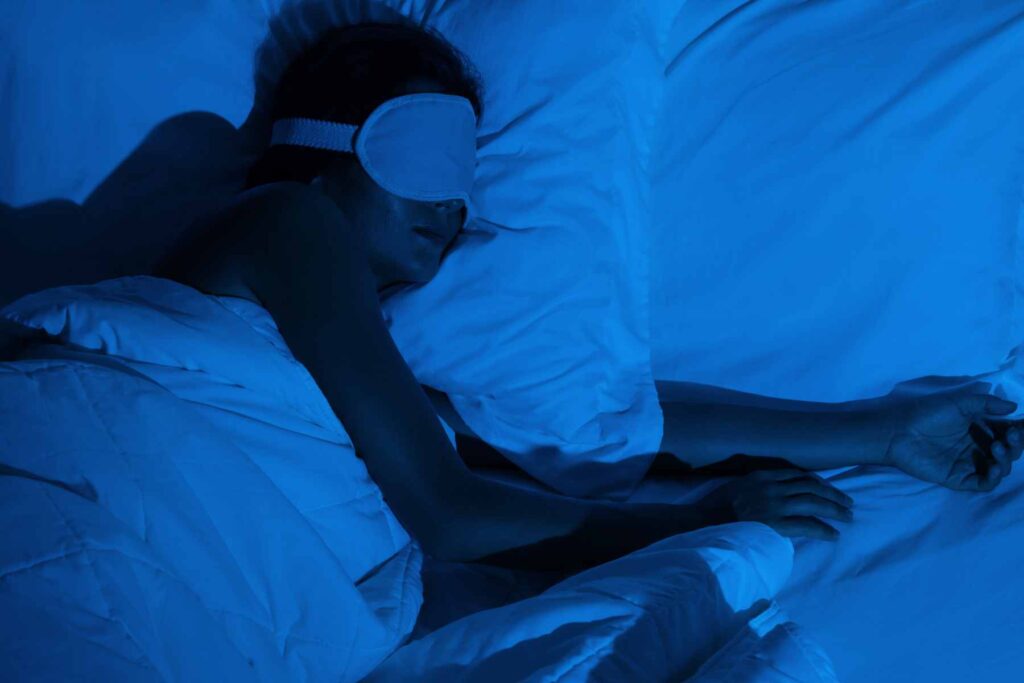
10 Hacks for Improving Sleep
1. Establish a Consistent Sleep Schedule
Aim to go to bed and wake up at the same times every day, even on weekends. This regularity helps set your body’s internal clock, making it easier to fall asleep and wake up naturally.
2. Create a Bedtime Ritual
Dedicate 30 to 60 minutes before bed to unwind with calming activities. This could include reading, gentle yoga, or a warm bath. These activities signal to your body that it’s time to wind down.
3. Optimize Your Sleep Environment
Make your bedroom conducive to sleep: ensure it’s cool, quiet, and dark. Consider using blackout curtains, white noise machines, and maintaining a comfortable temperature (around 60-67°F or 15-19°C).

4. Limit Exposure to Screens
Avoid screens (phones, tablets, computers) at least an hour before bedtime. The blue light emitted can interfere with your body’s ability to produce melatonin naturally.
5. Watch Your Intake of Caffeine and Alcohol
Cut off caffeine at least six hours before bed and minimize alcohol intake, as both can disrupt your sleep cycle and affect sleep quality.
6. Embrace the Power of Melatonin and Magnesium
Consider supplementing with melatonin and magnesium if you struggle with sleep. Start with low doses and adjust as needed, always in consultation with a healthcare provider. For melatonin, I personally trust and use melatonin from Nature’s Night and also recommend reading this article on the Sleep Doctor’s website (Dr. Michael Breus is a sleep guru).

7. Incorporate Physical Activity into Your Day
Regular, moderate exercise can help you fall asleep faster and enjoy deeper sleep, but try to finish any vigorous workouts at least three hours before bedtime.
8. Manage Stress and Anxiety
Practice stress-reduction techniques such as meditation, deep breathing exercises, or journaling to calm your mind before bed.
9. Be Mindful of Your Eating Habits
Avoid heavy meals and large amounts of liquids close to bedtime to prevent discomfort and frequent bathroom trips.
10. Use the Oura Ring
Consider using sleep tracking devices like the Oura Ring to gain insights into your sleep patterns and make informed adjustments to your habits and environment.

Coaching Sessions
I am currently offering one-on-one coaching sessions to help individuals who may be facing challenges in achieving their goals independently. My goal as a coach is to guide and support you in every step of your journey, while also holding you accountable for the actions you take towards achieving your desired outcomes.
Whether you want to improve your health and wellness, establish better habits, or achieve personal and professional growth, I can provide you with personalized attention, a customized approach that suits your unique needs, and the necessary tools and motivation to help you reach your full potential and transform your life.

Conclusion
Implementing good sleep habits is not an overnight fix but a lifelong journey of tuning in to your body’s needs. Making sure your bedroom becomes a sanctuary of calm, reducing exposure to stimulating activities and substances, and nurturing habits that help you relax and fall asleep are all vital steps on this path. It’s about consistency, patience, and a willingness to experiment and find what truly works for you.
As you move forward, remember that getting quality sleep is absolutely possible and can be quite easy once you know what works for. Whether it’s adjusting your exposure to light, fine-tuning your evening routine, or simply learning to prioritize sleep, each step is a building block towards achieving the restorative rest you deserve. Let the pursuit of better sleep guide you towards a healthier, more vibrant life, where daytime fatigue becomes a thing of the past, and each morning greets you with the promise of new possibilities.
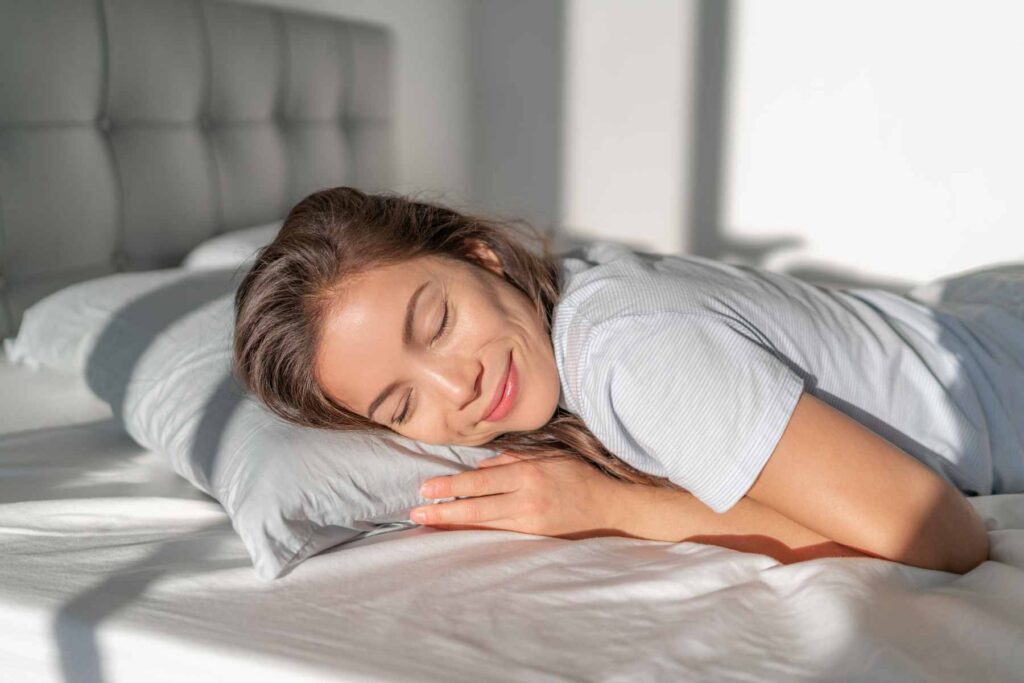
FAQs
Numerous factors can disrupt sleep, including exposure to light before bedtime, stress, noise pollution (like traffic noise), and lifestyle habits such as consuming caffeine or alcohol close to bedtime. To address these, establish a calming pre-sleep routine, make your bedroom a technology-free zone to avoid exposure to blue light, and try to minimize noise disruption with white noise machines or earplugs. Avoiding stimulants and alcohol several hours before sleep can also significantly improve your sleep quality.
Establishing a consistent bedtime routine is key. This could include activities that help you relax, such as reading, taking a warm bath, or practicing meditation and deep breathing exercises. Reducing your exposure to screens and ensuring your sleeping environment is conducive to rest (cool, dark, and quiet) can also make a big difference in helping you drift off to sleep.
Your diet can greatly affect your sleep quality. Consuming large meals, caffeine, or alcohol close to bedtime can interfere with sleep. Harvard Medical School suggests that a balanced diet rich in fruits, vegetables, whole grains, and lean proteins can promote better sleep, especially when combined with regular physical activity. Additionally, being overweight or obese can increase the risk of sleep disorders such as sleep apnea, which can disrupt nighttime sleep.
Feeling sleepy during the day is often a sign of poor sleep quality or insufficient nighttime sleep. To combat this, focus on establishing healthy sleep habits, such as going to bed and waking up at the same time each day, ensuring you get the recommended amount of sleep for your age group, and creating a restful sleeping environment. Avoiding naps late in the day can also help you stay awake and ensure you are tired enough to sleep well at night.
Yes, there are many apps designed to help you sleep. Look for apps that offer features such as sleep tracking, meditation and relaxation exercises, or soothing sounds. Some apps provide soothing sounds or guided meditations to help you relax and get to sleep, for me, I love using the Oura ring because it gives me the data I need to optimize my sleep.
A few simple tips would be to stick to a sleep schedule by going to bed and waking up at the same time each day. Also, create a bedtime routine to signal to your body it's time to wind down and exercise regularly but avoid vigorous activity close to bedtime. And of course, limit caffeine and avoid alcohol, especially in the hours leading up to sleep.
The amount of sleep needed can vary by age and individual needs, but generally, adults require 7-9 hours of sleep per night. Listening to your body and adjusting based on how you feel during the day can help you determine the optimal amount of sleep you need.
Yes, chronic poor sleep can lead to various health issues, including obesity, heart disease, high blood pressure, and diabetes. Quality sleep is crucial for physical health, mental clarity, and overall well-being.
To stay asleep longer, ensure your sleep environment is ideal for rest. Avoiding large meals and stimulants before bedtime can help, as can engaging in relaxing activities as part of your bedtime routine. If you find yourself waking up due to stress or anxiety, consider practicing mindfulness or relaxation techniques to help you return to sleep more easily.
If you can't fall asleep quickly, don't force it. Get out of bed and engage in a quiet, relaxing activity until you feel sleepy again. Avoid bright lights and screens, as they can signal your brain to stay awake. This strategy can prevent the frustration of tossing and turning and help you associate your bed with sleep.
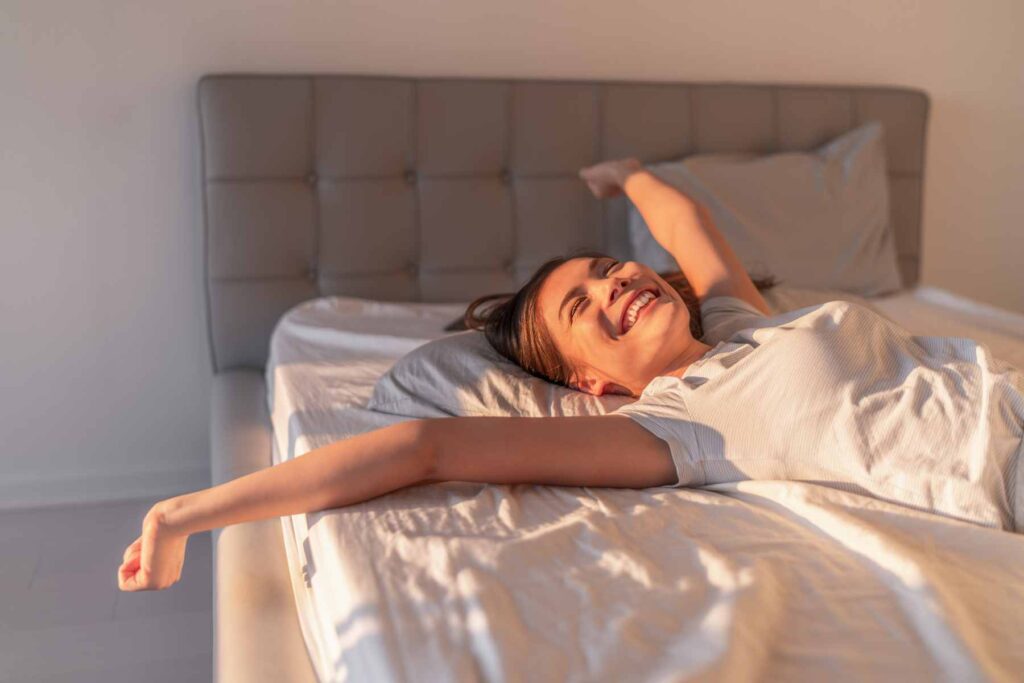
Additional Resources

With a positive approach and a motivation mindset, you will reach your health goals, no matter how hard they may seem at first. Learn more about my one-on-one coaching program here.








